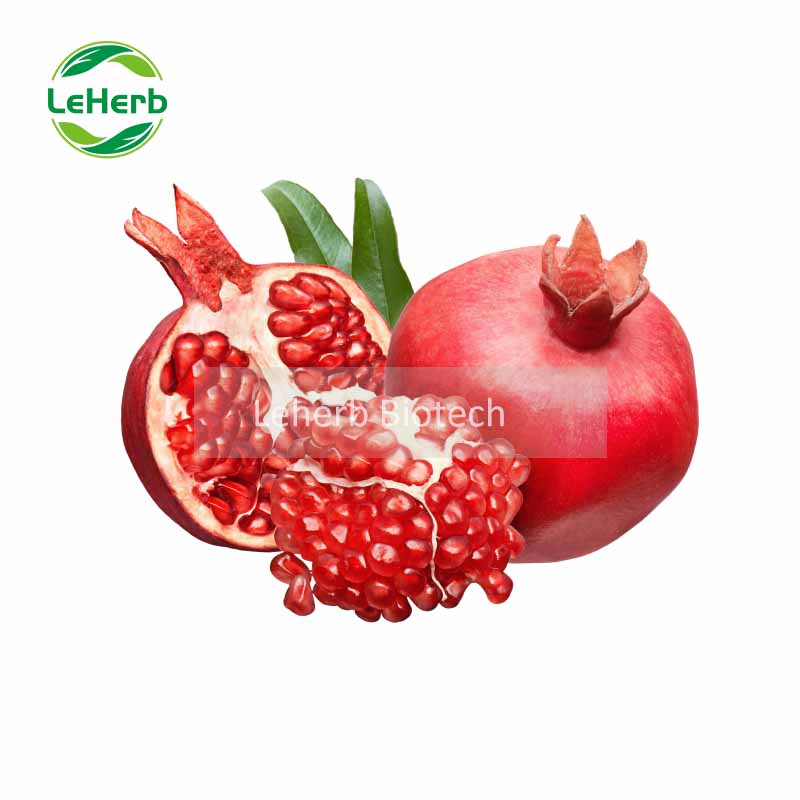Pomegranate, also known as Danjo, is the fruit of Punica grantum L., a plant belonging to the pomegranate family. It is native to Iran, Afghanistan and India and has been cultivated for more than 5,000 years. It was first recorded in Lu Ji’s Book with his Brother Yun in the Jin Dynasty, “Zhang Qian lived abroad for 18 years and got a pomegranate from Tu Lin An.
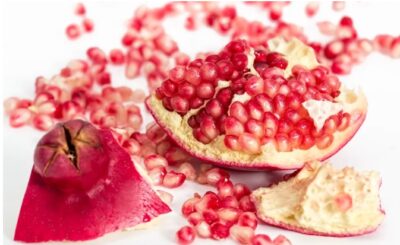
Chinese pharmacopoeia records that pomegranate skin acid, astringent, warm, with astringent intestinal diarrhea, hemostasis, insect repellent and other functions. And modern research shows that pomegranate in addition to rich in carbohydrates, proteins, various amino acids and essential trace elements of the human body, but also contains a large number of bioactive substances, such as polyphenols, flavonoids, alkaloids, organic acids, phenylpropanoids, steroids, etc., these substances have good nutritional health care effects. It is a reliable source of natural active ingredients for food, medicine, health care products, skin care products and so on. And different parts of the pomegranate contain different active ingredients.
Pomegranate juice: Nutrition, efficacy and application
Pomegranate juice, accounting for 60% to 80% of the total weight of the fruit, is rich in vitamin C, B vitamins, flavonoids, amino acids, fatty acids, organic acids and other nutrients. Studies have shown that pomegranate juice has the effect of promoting digestion, reducing blood sugar, softening blood vessels, improving vision and preventing heart disease, and can also help eliminate free radicals, fade age spots, improve blood vessel elasticity, anti-oxidation, anti-wrinkle, anti-aging, beauty and skin care. The key components of pomegranate juice are gallic acid, angellin and angellin, as well as anthocyanin and other polyphenols and flavonoids. [1,3] The antioxidant potential of pomegranate juice exceeds that of red wine and green tea, which is mainly due to the antioxidant capacity of ellagic acid and hydrolyzed tannin and the inhibition of inflammatory markers. Pomegranate juice also showed anti-diabetic effects by enhancing the expression of PPAR-γ (peroxidase proliferator-activated receptor) and increasing the production of nitric oxide. It can also increase the expression and enzyme activity of paraoxophosphorase gene and significantly reduce blood glucose content. The anti-diabetic effect of pomegranate juice has been verified in clinical trials, and drinking pomegranate juice does not have a negative effect on blood glucose parameters in diabetic patients, but has an antioxidant effect on serum and macrophage cells. Pomegranate juice extract can also play a role in slowing atherosclerosis by reducing the increase of oxidized low-density lipoprotein, inhibiting the synthesis and accumulation of cholesterol, and inhibiting the formation of foam cells. Daily drinking pomegranate juice also has a certain improvement effect on diabetes, which is beneficial to human health. In medicine, pomegranate juice is used in the prevention and control research of hypertension, coronary heart disease, breast cancer, arteriosclerosis, leukemia and diabetes, etc. In the field of daily chemical, pomegranate juice extract is used in cosmetics such as skin care products, perfumes and soaps, and in the field of food, pomegranate juice is used in processed products such as dairy products, beverages, fruit juices and wines.
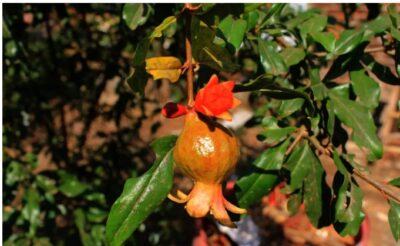
Pomegranate peel: Nutrients, effects and applications
Pomegranate peel, accounting for 20% to 35% of the total weight of the fruit, acid, astringent taste, rich in amino acids, minerals, and other bioactive compounds, such as tannins, flavonoids, organic acids and alkaloids. Tannins, also known as tannins, are generally divided into hydrolyzed tannins, condensed tannins and complex tannins. The tannin compounds in pomegranate skin contain high content, mainly hydrolyzed tannin, which consists of angellin, angellin, gallic acid and ellagic acid, among which angellin is the main one, accounting for about 80% of the total tannin in pomegranate skin.
Studies have shown that pomegranate peel extract has strong antioxidant activity and anti-inflammatory ability, which can increase the body weight and colon length, reduce the expression levels of TNF-α, IL-17A, IFN-γ and MDA (malonaldehyde), and increase the activity of glutathione peroxidase in DSS induced mice. It can significantly improve DSS induced ulcerative colitis in mice. In vitro studies have shown that the tannin component, angava side, plays a major role in it. Antigranin inhibits lipid peroxidation by providing electrons and scavenging free radicals. Pomegranate peel extract also has a certain ameliorative effect on diabetes. For example, pomegranate peel water extract can promote the regeneration of islet beta cells, reduce fasting blood glucose and increase serum insulin level. The ethyl acetate extract from pomegranate peel also significantly promoted the growth and insulin secretion of islet cells in vitro, and had a protective effect on islet cells.
Pomegranate peel extract also has a certain ameliorative effect on diabetes, such as pomegranate peel water extract can promote the regeneration of islet beta cells, reduce fasting blood glucose and increase serum insulin level. The ethyl acetate extract from pomegranate peel also significantly promoted the growth and insulin secretion of islet cells in vitro, and had a protective effect on islet cells. Pomegranate peel extract also had certain inhibitory effects on α-amylase and α-glucosidase. These are related to the high content of polyphenols in the skin. Pomegranate peel extract also has a certain improvement effect on diarrhea caused by digestive disorders, and can cause intestinal muscle to contract continuously, promote bile secretion, enhance small intestine peristalsis, and regulate intestinal microbial flora metabolism. The polyphenols in pomegranate skin can also inhibit prostate hyperplasia, prevent the generation of skin melanin, and play a role in beauty whitening cosmetics.
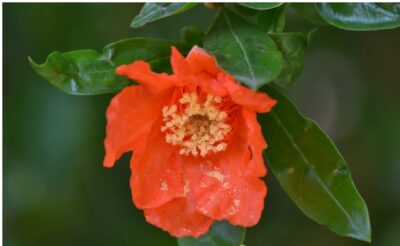
Pomegranate leaves: Nutrients, effects and applications
Pomegranate seeds: Nutrients, effects and applications
In pomegranate seeds, cellulose content is the most, followed by fatty acids, accounting for about 20% of the total weight of pomegranate seeds, of which unsaturated fatty acids account for more than 70% of the total fatty acids, including oleic acid, palmitic acid, stearic acid, pomegranate acid, linoleic acid and linolenic acid. Protein content accounted for about 12% of pomegranate seeds, with gluten content being the most; The total sugar content is about 10%, and the main component is reducing sugar.
Modern research has shown that pomegranate seeds are believed to be able to increase insulin sensitivity, reduce blood sugar levels and the risk of developing type 2 diabetes. The antioxidant activity of pomegranate seed oil is 62.23% of the maximum DPPH clearance rate, and has good antioxidant activity against vegetable oils. The structure of pomegranate acid in pomegranate seeds is similar to conjugated linoleic acid, and the content of pomegranate acid is more than 80%, which plays an important role in maintaining cell metabolism and enhancing immune barrier. Extracted pomegranate seed oil also promotes epidermal regeneration, because the unsaturated fatty acids in pomegranate seed oil are a powerful antioxidant, which can prevent or ameliorate atherosclerosis, aging, and depression. Pomegranate seed polyphenol is also a free radical scavenger and strong antioxidant, can be used in medicine, food, cosmetics, industrial new coating materials.
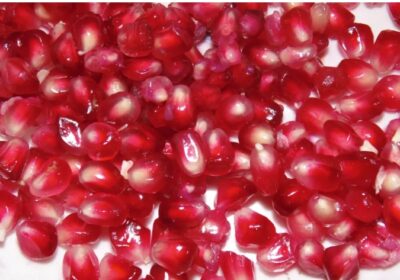
Summary and Propspect
Pomegranate fruit meat juicy, rich in nutrition, can be eaten directly, and can be processed into juice, fruit wine, etc., but also has a variety of pharmacological effects, has a high edible value and medicinal value of the fruit, as well as a wide range of development and utilization value. All parts of pomegranate fruit contain rich bioactive substances, such as polyphenols, flavonoids, ellagic acid and vitamin C. These ingredients have a variety of health benefits such as antioxidant, anti-inflammatory, anti-aging, anti-sugar, antibacterial and anti-cancer, and can effectively prevent and treat a variety of diseases. In addition, pomegranate also has a beauty and skin care effect, is widely used in skin care products and cosmetics formulations.
In the future, with the development of science and technology and the increasing demand for health, the application prospect of pomegranate will be broader. In the food industry, pomegranate can be further developed into a variety of health foods and beverages, such as pomegranate juice, pomegranate wine, pomegranate enzymes, etc., to meet consumer demand for natural health products. In the field of medicine, the bioactive ingredients and metabolites in pomegranates are extracted and isolated to develop new drugs and health products for the prevention and treatment of cardiovascular diseases, cancer, diabetes, etc. In addition, the application of pomegranate in beauty care products will also continue to grow, providing natural and effective skin care ingredients. Such a “multi-treasure plant” will become an important contributor to human health and bring new development opportunities for the modern food, medicine and beauty industries.

